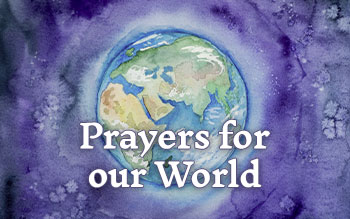Displaying items by tag: starvation
Ethiopia: unprecedented malnutrition
The UN warned of ‘unprecedented’ malnutrition among women and children as fears of mass starvation grow in Ethiopia’s embattled Tigray region. Ethiopia has expelled seven senior UN officials, including the head of UNICEF, for ‘meddling’ in its affairs. They suspended the operations of Doctors Without Borders and the Norwegian Refugee Committee, accusing them of spreading ‘misinformation’ about the war. Last November the prime minister sent troops to topple the Tigray People’s Liberation Front (TPLF) in response to its attacks on army camps. UN aid chief Martin Griffiths reported a three-month ‘de facto blockade’, restricting aid to 10% of what is needed for six million people. 400,000 people have ‘crossed the threshold into famine’. Federal officials blame TPLF for obstructing deliveries, but the US State Department said access to essential supplies and services was ‘being denied by the Ethiopian government’ and there were ‘indications of a siege’.
Ethiopia: man-made famine crisis
In Tigray 353,000 starving people are in phase 5 (catastrophe) and 1.769 million in phase 4 (emergency). In other words, famine, though the Ethiopian government refuses to call it famine. Huge numbers of deaths by starvation are unavoidable. In remote villages people are found dead in the morning, having perished overnight. Women who were kidnapped by soldiers and held as sexual slaves, now in hospitals or safe houses, are separated from their children, tormented by the fear they will starve without their mothers' care. Death by starvation happens when the undernourished body consumes its own organs to generate enough energy to keep a flicker of life. Most of the nation is controlled by rebels or military who do not cooperate with humanitarian agencies. Eritrean forces joined the conflict and along with the Ethiopian army they pillage, burn crops, destroy health facilities, and prevent farmers from ploughing their land. This is a man-made famine. There is no drought, and last year's locust swarms have gone.
Sudan: starvation is a war weapon
Starvation is being intentionally used as a war tactic in South Sudan’s brutal conflict, a UN-backed human rights panel report stated. South Sudan gained independence in 2011 but descended into conflict 2½ years later, following tensions between President Salva Kiir and his deputy. Most South Sudanese are Christian, whereas the majority in Sudan belong to the Sunni branch of Islam. Religion deeply influences governance and daily life, playing a dominant role in the nation's politics. The brutal fighting has caused incalculable suffering to civilians, and resulted in staggering levels of acute food insecurity and malnutrition. 7.5 million South Sudanese, in several areas, currently require humanitarian assistance. Both governments and opposition forces have deliberately used the starvation of civilians as a method of warfare in these areas, sometimes as an instrument to punish non-aligning communities, as in the case of Jonglei.
Good News - 2019 was the Best Year Ever
Let’s be encouraged and thankful as we reflect on some positive statistics and information that Nicholas Kristoff has compiled in the New York Times.
For humanity over all, life just keeps getting better.
If you’re depressed by the state of the world, let me toss out an idea: In the long arc of human history, 2019 has been the best year ever.
The bad things that you fret about are true. But it’s also true that 2019 was probably the year in which children were least likely to die, adults were least likely to be illiterate and people were least likely to suffer excruciating and disfiguring diseases.
Every single day in recent years, another 325,000 people got their first access to electricity. Each day, more than 200,000 got piped water for the first time. And some 650,000 went online for the first time, every single day.
Perhaps the greatest calamity for anyone is to lose a child. That used to be common: Historically, almost half of all humans died in childhood. As recently as 1950, 27 percent of all children still died by age 15. Now that figure has dropped to about 4 percent.
“If you were given the opportunity to choose the time you were born in, it’d be pretty risky to choose a time in any of the thousands of generations in the past,” noted Max Roser, an Oxford University economist who runs the Our World in Data website. “Almost everyone lived in poverty, hunger was widespread and famines common.”
But … but … but President Trump! But climate change! War in Yemen! Starvation in Venezuela! Risk of nuclear war with North Korea. …
All those are important concerns, and that’s why I write about them regularly. Yet I fear that the news media and the humanitarian world focus so relentlessly on the bad news that we leave the public believing that every trend is going in the wrong direction. A majority of Americans say in polls that the share of the world population living in poverty is increasing — yet one of the trends of the last 50 years has been a huge reduction in global poverty.
As recently as 1981, 42 percent of the planet’s population endured “extreme poverty,” defined by the United Nations as living on less than about $2 a day. That portion has plunged to less than 10 percent of the world’s population now.
Every day for a decade, newspapers could have carried the headline “Another 170,000 Moved Out of Extreme Poverty Yesterday.” Or if one uses a higher threshold, the headline could have been: “The Number of People Living on More Than $10 a Day Increased by 245,000 Yesterday.”
Many of those moving up are still very poor, of course. But because they are less poor, they are less likely to remain illiterate or to starve: People often think that famine is routine, but the last famine recognized by the World Food Program struck just part of one state in South Sudan and lasted for only a few months in 2017.
Diseases like polio, leprosy, river blindness and elephantiasis are on the decline, and global efforts have turned the tide on AIDS. A half century ago, a majority of the world’s people had always been illiterate; now we are approaching 90 percent adult literacy. There have been particularly large gains in girls’ education — and few forces change the world so much as education and the empowerment of women.
You may feel uncomfortable reading this. It can seem tasteless, misleading or counterproductive to hail progress when there is still so much wrong with the world. I get that. In addition, the numbers are subject to debate and the 2019 figures are based on extrapolation. But I worry that deep pessimism about the state of the world is paralyzing rather than empowering; excessive pessimism can leave people feeling not just hopeless but also helpless.
Readers constantly tell me, for example, that if we save children’s lives, the result will be a population crisis that will cause new famines. They don’t realize that when parents are confident that their children will survive, and have access to birth control, they have fewer children. Bangladesh was once derided by Henry Kissinger as a “basket case,” yet now its economy grows much faster than America’s and Bangladeshi women average just 2.1 births (down from 6.9 in 1973).
Yes, it’s still appalling that a child dies somewhere in the world every six seconds — but consider that just a couple of decades ago, a child died every three seconds. Recognizing that progress is possible can be a spur to do more, and that’s why I write this annual reminder of gains against the common enemies of humanity.
So I promise to tear my hair out every other day, but let’s interrupt our gloom for a nanosecond to note what historians may eventually see as the most important trend in the world in the early 21st century: our progress toward elimination of hideous diseases, illiteracy and the most extreme poverty.
When I was born in 1959, a majority of the world’s population had always been illiterate and lived in extreme poverty. By the time I die, illiteracy and extreme poverty may be almost eliminated — and it’s difficult to imagine a greater triumph for humanity on our watch.
By Nicholas Kristof, Opinion Columnist, NY Times
More at: https://www.nytimes.com/2019/12/28/opinion/sunday/2019-best-year-poverty.html
Pray: giving thanks for the positive steps that are being made across the quoted areas including life expectancy, poverty, literacy, education, health and access to utilities.
Pray: that these advancements will not falter and that governments will continue to invest in improvements in the quality of life of their people.
Yemen: continue to pray
Yemen has suffered a three-year civil war. Over 10,000 people have died, and three million have been displaced. Many are starving or on the verge of having nothing to eat. Malnutrition and infant mortality are becoming normal. Pray that ships, aeroplanes and trucks will be given permission to bring the abundance of food and supplies that are needed. Pray that those who seek to exploit others due to high prices will be led by God to put aside greed and help the many who are battling poverty. Pray that those who are fighting one another will put aside their differences and go to the negotiating table to work together for peace. Roads, houses, schools, factories, oil fields, and hospitals are destroyed. Pray that peace will come so that rebuilding can begin.
Venezuela: ‘we call it survival’
Food is rotting in refrigerators, people needing dialysis die as hospital equipment shuts down. Diabetics pick leaves, high in sugar, from neem trees amid fears for insulin supplies which must be kept refrigerated. Venezuela has frequent power cuts. It is illegal to fill jerry cans - so people resort to the black market for fuel for generators. ‘The government calls it contraband - we call it survival,’ said a resident. Recently an electrical substation caught fire in unexplained circumstances, which added to the sense of desperation in a neighbourhood experiencing outbreaks of looting. Citizens have mounted lookouts to warn of government security forces and paramilitary gangs called colectivos, who they fear will take down their jerry-rigged homes where residents pump water from a well and take turns carrying supplies to elderly neighbours on higher floors. Analysts and engineers say underinvestment in a network mismanaged by soldiers rather than qualified technicians has caused the power cuts. See
Yemen: 85,000 children have starved to death
Save the Children (SCF), using UN data, have found that huge numbers of children under 5 perished from severe hunger. Some 84,701 children may have died between April 2015 and October 2018 because of a lack of food. Parents had to witness their children wasting away, unable to do anything about it. Since the Saudi-Emirati military intervention in March 2015, commercial imports of food through the vital Hodeidah port have been reduced by more than 55,000 tonnes a month, enough to meet the needs of 4.4 million people, half of whom are children, SCF said. The World Food Programme says that up to 14 million Yemenis are now at risk of starvation as fighting rages on in Hodeidah. 'Any further decline in imports could well lead directly to famine,' it warned. Multiple past attempts to hold negotiations between the government alliance and Houthis have failed.
Yemen: 13 million at risk of death
The UN has warned of a historic famine that could put as many as 13 million people in Yemen at risk of death by starvation. The fierce fighting between Saudi-backed government forces and Houthi rebels, and the ongoing blockade of aid shipments, have created the conditions for humanitarian disaster on a scale not seen since Ethiopia in the 1980s or the Soviet Union in the 1930s. 75% of the population need food assistance; 8 to 10 million go hungry daily. Prices have doubled in the past month. The war has killed 10,000 to 50,000 civilians and displaced over two million. Civilian deaths are up 164% since the beginning of the siege of the port city of Hodeidah in June. When 17 were killed on 14 October by Saudi planes bombing buses waiting at a Houthi checkpoint, it was just another daily occurrence. People say, ‘Why is Saudi Arabia under attack over Jamal Khashoggi (a missing, presumed murdered reporter), but not over Yemen?’ See
Switzerland: Congo aid conference
The Democratic Republic of Congo (DRC) boycotted a UN donor conference in Geneva that was seeking to raise £1.2bn for the country. Over 13 million Congolese need humanitarian aid. It is a catastrophic humanitarian crisis. Aid agencies say 4.5 million people have been forced from their homes by violence, hunger and instability. Tens of thousands of Congolese have sought refuge in western Uganda. DRC is rich in mineral and other resources, but is affected by armed conflicts, corruption and a political crisis. In the past two years, more people have been displaced in DRC than in any other country. Many believe the international community is ignoring the crisis, where two million children are at risk of starvation.
Global: 20 million close to starvation
In February Prayer Alert readers were told of 1.4 million children at risk of starvation in Yemen, South Sudan, Somalia, and northeast Nigeria. The crisis has worsened. Millions of people are caught in conflicts within their countries. Livelihoods are disrupted, and they cannot produce food. This is a God-sized situation that requires intercession and His intervention. The UN needs $4.4 billion by July to prevent famine in these countries. An official said the organisation is facing its largest humanitarian crisis since its creation. Without the funding and collective and coordinated global efforts, people will simply starve to death. Yemen's needs are the most critical: two-thirds of the population (19 million) need assistance. In South Sudan, 7.5 million need help. In Somalia and northeastern Nigeria there is also severe food insecurity because of violence and instability. See also









